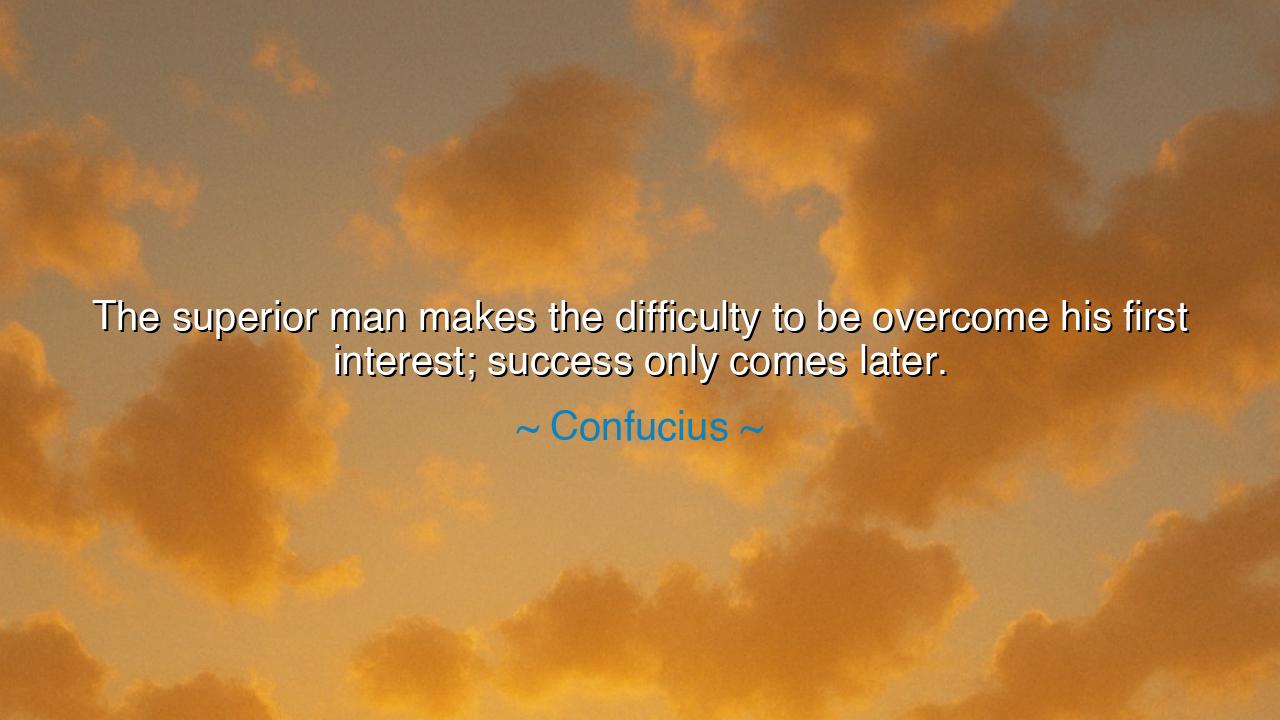
The superior man makes the difficulty to be overcome his first
The superior man makes the difficulty to be overcome his first interest; success only comes later.






“The superior man makes the difficulty to be overcome his first interest; success only comes later.” Thus spoke Confucius, sage of the East, whose words flow like a river of wisdom across the ages. In these lines, he teaches us that true greatness is not found in the glittering prize, but in the labor, the trial, the struggle that forges the soul. The one who sets his heart first upon the difficulty is noble, for he understands that the road itself is the teacher, and that success is but the shadow that follows diligence.
The ancients often declared: “He who seeks the crown must first endure the thorns.” Confucius reminds us that the superior man—the one of character and strength—does not chase rewards, nor is he blinded by the fruits of victory. Instead, he embraces hardship as the forge of virtue. The lazy man prays for ease; the superior man welcomes difficulty, knowing it is the stone upon which his blade is sharpened. For only by mastering the challenge does the triumph come, and only by walking through fire can one carry the glow of wisdom.
Consider the story of Abraham Lincoln, who faced repeated failures in business, politics, and personal life. His road was littered with defeats—elections lost, ventures ruined, grief endured. Yet he did not turn his gaze to success as an immediate prize. Instead, he fixed his will upon the difficulties before him, learning, enduring, and strengthening himself. When his moment came to lead a fractured nation through civil war, it was the years of wrestling with hardship that gave him the strength to endure. Thus, his greatness was born not from an obsession with triumph, but from the discipline of struggle.
Or recall the tale of Thomas Edison, who sought to bring light to the world through invention. Thousands of times he failed, yet each failure was not defeat, but a difficulty to be studied, understood, and overcome. He declared, “I have not failed. I have simply found ten thousand ways that do not work.” His success was the byproduct of his devotion to the problem, not a prize he demanded from fortune. Like the superior man of Confucius, Edison fixed his eyes upon the difficulty itself, and from that faithfulness arose his legacy.
The meaning of Confucius’s words is clear: to long for success before embracing struggle is to court disappointment. The impatient soul demands fruit before the seed is planted; the wise soul tends the soil, knowing harvest will come in its season. The superior man is patient, steadfast, and humble, honoring the process above the prize. In so doing, he not only gains victory but becomes transformed by the path itself.
The lesson is this: do not set your heart on success as the first goal. Instead, turn your mind to the difficulty that lies before you. Embrace the problem as your teacher, the hardship as your forge. Let your energy rest not in dreams of glory but in the small, steady steps of labor and perseverance. For when the difficulty is mastered, success cannot be denied—it follows as day follows night.
Practical counsel follows: when you face challenges, do not shrink back or despair. Ask yourself not, “How soon will I succeed?” but, “What must I learn here? How must I endure? What strength must I build?” Break your hardship into parts and meet each with patience. Celebrate progress, not just the final crown. For the crown is fleeting, but the wisdom gained from conquering difficulty is eternal.
So remember this, O seekers of wisdom: the superior man does not hunger for the applause of victory, but for the discipline of the struggle. Fix your eyes on the challenge, give yourself wholly to its overcoming, and in time, success will follow you as a faithful shadow. This is the teaching of Confucius, a lamp for all generations who would walk the road of greatness.






AAdministratorAdministrator
Welcome, honored guests. Please leave a comment, we will respond soon